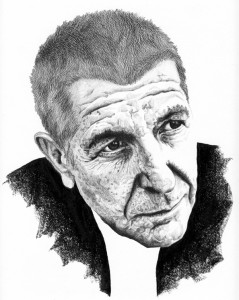Leonard Cohen releases his 12th album, Old Ideas.

But not Cohen: He’s featured on the album’s cover, dressed in a suit and a tie, donning his trademark fedora and wearing dark shades, sitting on a blue wooden chair in a Los Angeles backyard, grinning slightly, and reading a book. It’s a fitting pose for the man he’s become, the kind and pensive dispenser of profound truths who earns in acclaim what he lacks in raw popularity; he’s the only entertainer around who looks as natural receiving Spain’s top literary award from Prince Felipe as he does sharing the dais with Madonna and John Mellencamp at the 2008 Rock & Roll Hall of Fame induction ceremony that honored all three. Even that almanac of cool, the Financial Times, recently saw fit to lionize St. Leonard, calling him “a sage for the post-crisis age.”
It wasn’t a role he was preordained to play. Throughout his life, it often seemed as if Cohen’s greatest talent was for falling out of step. In 1965, when Dylan plugged in and Jim Morrison spent the summer subsisting on LSD and baked beans and forming the Doors, Cohen, then still a poet, appeared on Canadian TV. “I wake up every morning and check if I am in a state of grace,” he told a television crew. “If not, I go back to bed.” He was in his mid-thirties when he first stepped out on stage with a guitar, an experience so traumatic that he fled after a few bars and only came back when Judy Collins, his friend and patron, soothed him and accompanied him back into the limelight. When his career finally took off, mainly in Europe, he realized that the musical milieu with which he most firmly belonged, the singer-songwriters, was rapidly becoming passé. Young fans now wanted their music loud and spirited; Cohen’s was sad and soulful.
Many also found it depressing. In one of his songs, “Field Commander Cohen,” he poked fun at his public image, calling himself “the patron saint of envy/ and the grocer of despair.” An attempt to market him as a mainstream singer led to a collaboration with Phil Spector that ended with Spector holding a gun to Cohen’s head, hijacking the master tape, and releasing his version without Cohen’s consent. Spector’s arrangements took Cohen’s music from folk to funk; the singer, enraged, called the album “a catastrophe,” and the public and the critics agreed. This was in 1977; Cohen released another album, the largely forgotten Recent Songs, two years later, but by 1984 he felt ready for a breakthrough. He submitted nine new songs to his label, Columbia Records, including “Dance Me to the End of Love,” “If It Be Your Will,” and a biblically themed anthem he had hoped would catch on, “Hallelujah.” The label’s boss, the notoriously abrasive Walter Yetnikoff, listened to the tracks, took a long look at his 50-year-old artist, and said, “Look, Leonard, we know you’re great, but we don’t know if you’re any good.” He seemed to be speaking for the music industry in general; the album was shelved and eventually picked up by a much smaller label.
Read the rest of this article at Tablet Magazine
* Liel Leibovitz is at work on a book about Leonard Cohen, to be published next year by W.W. Norton.